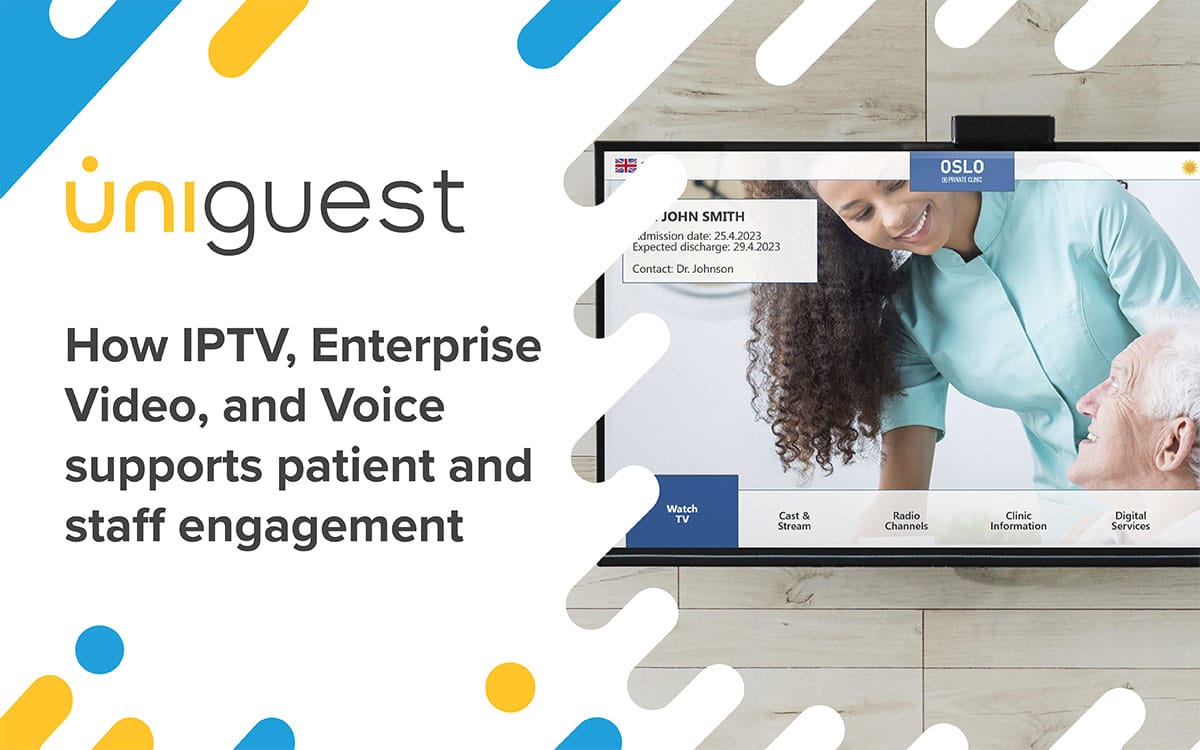
Wie IPTV, Unternehmensvideo und Sprache das Engagement von Patienten und Mitarbeitern unterstützen
In der heutigen, sich schnell entwickelnden digitalen Landschaft, in der technologische Fortschritte Branchen auf der ganzen Welt umgestalten, ist das Gesundheitswesen keine Ausnahme. Die Einführung von IPTV (Internet Protocol Television) und Unternehmensvideolösungen hat die Kommunikation und Zusammenarbeit in Gesundheitsorganisationen revolutioniert. In diesem Blog wird untersucht, wie diese Technologien die Effizienz, Zugänglichkeit und Effektivität der Kommunikation im Gesundheitswesen steigern.
IPTV-basiertes Patienten-TV: Personalisierte Unterhaltung und Bildung
Herkömmliche Patienten-TV-Systeme werden durch IPTV-basierte Lösungen ersetzt, die ein interaktiveres und persönlicheres Erlebnis bieten. IPTV ermöglicht den Patienten den Zugang zu einer breiten Palette von Unterhaltungsmöglichkeiten, einschließlich Filmen, Fernsehsendungen und Musik, was ihren Komfort und ihre Entspannung während ihres Aufenthalts erhöht.
IPTV-Systeme können auch Bildungsinhalte auf Abruf integrieren, z. B. Gesundheitstipps, Videos zur Krankheitsbewältigung und Wellness-Programme, die den Patienten wertvolle Informationen liefern, damit sie sich aktiv an ihrer eigenen Versorgung beteiligen können.
Darüber hinaus erleichtern einige IPTV-Lösungen, wie z. B. die Patienten-TV-Plattform von Uniguest, die Kommunikation zwischen Patienten und Gesundheitsdienstleistern, indem sie es ihnen ermöglichen, direkt vom Krankenbett aus Dienstleistungen anzufordern, Feedback zu geben oder auf Lehrmaterial zuzugreifen.
Unternehmensvideo: Erleichterung von Zusammenarbeit und Schulung
Unternehmensvideolösungen verändern die Kommunikation im Gesundheitswesen, indem sie eine nahtlose Zusammenarbeit und den Wissensaustausch zwischen Fachkräften im Gesundheitswesen ermöglichen. Mit Unternehmensvideoplattformen können Organisationen im Gesundheitswesen Gruppen- und Town-Hall-Meetings, Konferenzen und Schulungen durchführen, ohne dass eine physische Anwesenheit erforderlich ist, und die Teilnahme aus der Ferne ermöglichen.
Gesundheitsdienstleister können ihr Fachwissen weitergeben, komplexe Fälle besprechen und bewährte Verfahren austauschen, wodurch eine Kultur des kontinuierlichen Lernens und der Verbesserung gefördert wird. Darüber hinaus ermöglichen Unternehmensvideolösungen die Aufzeichnung und Archivierung wichtiger Schulungssitzungen und stellen sicher, dass wertvolles Wissen für zukünftige Referenzen und die Einarbeitung neuer Mitarbeiter zur Verfügung steht.
Sprachassistent: Verbesserung der Zugänglichkeit und Effizienz
Die Technologie der Sprachassistenten hat sich zu einem leistungsstarken Werkzeug in der Gesundheitsbranche entwickelt, das eine freihändige und intuitive Interaktion mit verschiedenen Systemen und Geräten ermöglicht. Sprachassistenten, wie z. B. Amazon Alexa, können in das Gesundheitswesen integriert werden und ermöglichen es den Patienten, per Sprachbefehl Informationen abzurufen, Termine zu vereinbaren oder Medikamente nachzufüllen. Die Sprachtechnologie verbessert die Zugänglichkeit für Personen mit Mobilitäts- oder Sehbehinderungen und fördert die Inklusion im Gesundheitswesen.
IPTV- und Unternehmensvideotechnologien spielen eine entscheidende Rolle bei der Verbesserung der Kommunikation im Gesundheitswesen. Mit IP-basierten Patienten-TV-Systemen können Patienten personalisierte Unterhaltung genießen und auf Bildungsinhalte zugreifen, während Unternehmensvideolösungen die Zusammenarbeit, Schulung und den Wissensaustausch zwischen Fachkräften im Gesundheitswesen erleichtern.
Darüber hinaus hat die Integration von Sprachsteuerungstechnologie die Zugänglichkeit und den Komfort von Informationen für Patienten, Besucher und Gesundheitsdienstleister verbessert. Durch den Einsatz dieser Technologien können Gesundheitseinrichtungen die Patientenerfahrung verbessern, die betriebliche Effizienz steigern und eine Kultur des kontinuierlichen Lernens und der Verbesserung fördern.
Erfahren Sie mehr darüber, wie die Lösungen von Uniguest ein verbessertes Engagement im Gesundheitswesen unterstützen und besuchen Sie www.uniguest.com/healthcare-wellness.